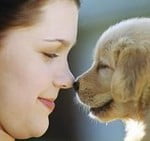Ten Tips for Perfect Pups
So, you have a new pup in the household, but do you know how to care for it? Browse through the following top tips to ensure your pup is getting the best of care.
2. Worming
Intestinal worms, especially hookworms and roundworms, are another common curse of the young pup. Pups can also become infected with tapeworms and whipworms. Don’t take the matter of worms too lightly because they commonly kill puppies.
Use a reliable all-wormer to treat your pup as soon as you get it, and then every two weeks until it is three months old. From then to six months of age, worm the pup every month and from six months of age onwards, worm it every three months.

3. Heartworm Prevention
Heartworm disease is another killer that has been around for years, but thankfully, it is now a lot less common than it used to be.
You should start your pup on heartworm preventive from eight weeks of age. The range of monthly preparations that are available are very good (most of which also control some intestinal worms) but many pet owners are moving to the Once-a-Year heartworm prevention to ensure they don’t forget their pet’s heartworm prevention.
4. Flea Control
Flea control has been made much easier and safer by modern science. Nowadays, most people use a monthly flea control preparation such as Advantage or Frontline Plus. Advantage now has a closely related brother that will also control heartworm. Alternatively, tablets are available that control fleas, heartworm and intestinal worms in one go. A variety of flea-control sprays are also available. It’s a complicated area so ask your veterinarian for more advice.

5. Diet
Feeding your pup a balanced diet is a basic task but it is important that you get it right. A good quality dry food is the easiest solution and, at the very least, a pup should be fed a growth formula. Better still, feed your pup a growth formula that is correct for its size. For instance, it is not correct to feed a Great Dane pup the same food you would give a Chihuahua pup. Your vet will be able to help further.
6. Puppy Pre-school
Now let us consider matters of the brain. It is not enough to ensure your pup is physically healthy – it needs to be mentally fit as well. The best way to start is with a puppy pre-school. Many vets, dog-training groups and the RSPCA conduct such a service and it is well worth your time to attend. The value of a puppy pre-school is that you learn about training, and the pup is exposed to gentle training techniques, to other dogs and to other people at its most impressionable age. This is a great start.
7. Toilet Training
Toilet training is also important. Many new pup owners battle with this task but it’s not difficult. Create a toilet spot in the garden and leave some of the pup’s deposits there to decay for a while so the smell gives the pup the correct message. Then predict the need so that you can praise the right action. Keep an eye on your pup and take it to the toilet spot after it eats, or wakes from a sleep (especially first thing in the morning) and whenever it has not ‘gone’ for a while. Be careful, too, of high stairs and small dogs. The stairs are a major impediment to the little fellas getting to the garden and thus learning the correct technique.

8. Identification
Keep your pup safe and sound by ensuring it is identified. A leather or fabric collar with a disk that includes your phone number is so cheap but is absolutely essential. Tags are also available from the RSPCA and from many vets. Microchipping is ideal as a permanent means of identification.
9. Desexing
Unless you have a firm commitment to breed from your dog, then it is usually better to have it neutered. Desexing prevents many health and behavioural problems. The usual age for the operation is from 5 months to 9 months of age.

10. Fences
We finish with one of the most important matters. No person should have a dog if they don’t have a dog-proof fence. Puppies can squeeze through very small gaps so ensure the base of the fence meets the ground and that gates are latched securely. When leaving your pup alone in your back yard, give it plenty of toys to play with.
